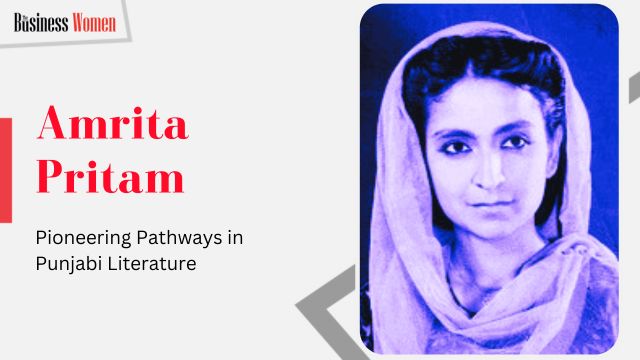Amplify Your Leadership Voice Worldwide
Join 7,000+ industry leaders sharing insights with millions of professionals globally
Join 7,000+ industry leaders sharing insights with millions of professionals globally

Amrita Pritam, a celebrated Indian novelist, essayist, and poet, is esteemed for her remarkable contributions to Punjabi and Hindi literature. Born on August 31, 1919, and passing away on October 31, 2005, her enduring legacy encompasses poetry, fiction, biographies, essays, folk songs, and an autobiography, all translated into numerous languages.
Known for delving into the complexities of the human experience and societal dynamics, Amrita Pritam’s evocative poems traverse geographical and temporal boundaries, leaving an indelible impression on readers. In 1956, she etched her name in history as the first and only woman to receive the Sahitya Akademi Award for Punjabi literature, honouring her masterful collection of poems, “Sunehade” (Messages).
In the realm of Punjabi literature, Amrita Pritam stands as an epitome of artistic excellence, boasting a prolific and diverse body of work exceeding 100 books. Initially known as a romantic poet, she later embraced the Progressive Writers’ Movement, fearlessly confronting contemporary issues, notably the aftermath of the Bengal famine in 1943.
The partition of India in 1947 profoundly impacted Amrita Pritam’s life and artistic oeuvre. Her poignant poem “Ajj aakhaan Waris Shah nu” (“Today I invoke Waris Shah”) became a symbolic expression of the anguish and horrors of the partition, resonating with countless individuals who had witnessed its pain and trauma.
More than a personal lament, “Ajj aakhaan Waris Shah nu” became a testament to the resilience of the human spirit, echoing the collective suffering experienced during that tumultuous period.
Beyond her unparalleled poetry, Amrita Pritam left an indelible mark in fiction with her powerful narrative, “Pinjar” (“The Skeleton”), published in 1950. This exploration of violence against women and the acceptance of existential fate was adapted into the award-winning film “Pinjar” in 2003.
Amrita Pritam’s literary contributions earned widespread acclaim. The Jnanpith Award in 1982 for “Kagaz Te Canvas” (“The Paper and the Canvas”), the Padma Shri in 1969, and the Padma Vibhushan in 2004 highlighted her achievements. The Sahitya Akademi Fellowship in 2004, a testament to her lifetime achievements, solidified her enduring impact on literature.
Amrita Pritam’s life journey, fraught with hardships and personal tribulations, began in 1919 in Gujranwala, British India. Orphaned at eleven, she relocated to Lahore with her father, Kartar Singh Hitkari, himself a poet. Her early writings, including her debut anthology at sixteen, mirrored the challenges she encountered. Marrying Pritam Singh in 1936, she adopted the name Amrita Pritam.
Amrita Pritam’s versatile career spanned poetry, fiction, essays, and autobiographies like “Black Rose” (1968) and “Rasidi Ticket” (1976), providing insights into her life and evolution as a writer. Her collaboration with Imroz, both personally and artistically, showcased their shared journey.
Amrita Pritam’s life intertwined with an unrequited love for poet Sahir Ludhianvi, chronicled in “Rasidi Ticket.” Finding solace in the companionship of Inderjeet Imroz for forty years, their love story became the subject of the book, “Amrita Imroz: A Love Story.”
Amrita Pritam’s works, translated into numerous languages, have captivated audiences worldwide. Google commemorated her 100th birth anniversary in 2019 with a Google Doodle, underscoring her role as a leading female Punjabi writer.
Amrita Pritam’s work transcends temporal boundaries, inspiring generations with profound poems and fearless exploration of societal issues. An icon of resilience, love, and the written word, her legacy lives on through timeless creations, cementing her status as an enduring literary icon.
Join industry leaders who have shared their insights with millions of professionals globally.